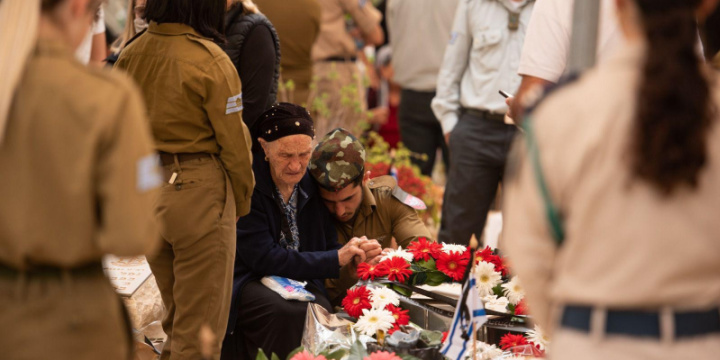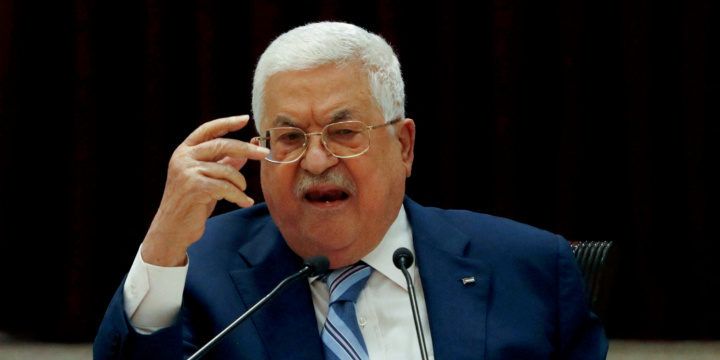Judaism and Ethical Warfare
 by Jeremy Rosen
by Jeremy Rosen

Mourners visit the graves of fallen IDF soldiers at Israel’s Yom HaZikaron ceremony. Photo: Israel Defense Forces
The ongoing conflict in Ukraine raises important moral issues about warfare. Some people believe that all violence is wrong under all circumstances. Pacifism has a long tradition in some religions. Judaism, on the other hand, takes a pragmatic standpoint. As Russia defies every moral standard in Ukraine, what does Judaism have to say about warfare? And as we have just celebrated Israeli Independence Day and 74 years of constant existential threats, how do we match up?
The moral issues of warfare are complex, and continue to be debated. Under what conditions must one fight? When can one refuse orders? Can we allow preemptive strikes, targeted assassinations, human shields, weapons hidden in civilian buildings, unwarranted destruction of property and supplies, landmines, and missiles, not to mention the use of poison gas and nuclear weapons? All of these are issues that continue to be debated around the world, and have not been resolved. Should we just give up, and avoid conflict regardless of the consequences? Should we allow Russia’s Vladimir Putin to destroy Ukraine — or Hamas, Iran, or Hezbollah to destroy Israel? I do not believe so. But we should be very careful to wage war as humanely as possible.
“Because the Lord your God walks amid your camp, to save you and to give up your enemies before you, therefore your camp must be holy, that there should be nothing immoral or corrupt among you” (Deut. 23:15). Nachmanides, in his commentary on that verse, explains that because moral restraints are loosened at the time of war, we must be extra vigilant and humane.
The Bible expresses its abhorrence of violence in many ways. The altar in the Tabernacle was built without the use of metal tools, because of their association with violence. King David was not allowed to build the Temple because of his war-like career. The dream of the prophets was to beat swords into plowshares, and to never more teach war (Isaiah 2:4).
We differentiate between wars. The Mishna’s War of Obligation was essentially one of defense, and a matter of existential survival. Every single citizen was obliged to participate in one way or another, either by fighting or by providing ancillary support.
Among the specific laws laid down regarding warfare are: “When you draw near to a city to fight against it, you should offer peace to it” (Deut.20:10); “When you besiege a city for a long time, making war against it to take it, you shall not destroy its trees by wielding an axe against them, but you may eat of them” (Deut. 20:19); you must respect treaties and not lie (Maimonides Hilchot Melakhim 6:3); there must be a way left open out of besieged cities to allow civilians to escape (Ibid 6:7); and a prohibition against the destruction of property in general (ibid 6:8).
Since the struggle for the establishment of Israel, we have had to address these issues of warfare and the moral constraints on warfare in modern terms. How are we to deal with a situation today where no permanent peace has been agreed upon with the Palestinians, 74 years after the Arab world declared war and invaded, while still violence continues? How do we react when one part of an enemy population has not made peace, while others encourage violence? What actions can we take to discourage attacks? How do we deal with an enemy that uses human shields or locates weapons in civilian areas, while sending rockets against our civilians? Who can we trust to make peace?
Despite the constant threats, the Israeli army has strict rules of engagement and important principles of moral warfare. “The Purity of Arms” is a core principle of the miliary: “The IDF servicemen and women will act judiciously and safely in all they do, out of recognition of the supreme value of human life.”
It is a source of pride that we have such a concept.
Of course, there have been disastrous mistakes, poor decisions, and rogue soldiers who have ignored the rules. Some military tribunals have made poor decisions, some commanding officers have exceeded their remits, and politicians have failed to grasp some opportunities and squandered others. But unless one lives under such constant threat to life and limb, and the constant fear of losing a loved one, it is hard to pass unbiased judgment. As a general rule, the standards of Israel’s army, especially when compared to every other military, are really impressive.
There are, naturally, different rabbinic points of view in Israel across the spectrum from right to left. Should one allow collective punishment? Can one demolish the houses of a terrorist? Is there a halakhic obligation to allow the enemy an avenue of escape if they may return to the offensive? Contemporary halakhic authorities disagreed as to whether the Israeli army should allow terrorists to escape during a siege. Others say there is religious justification for harsher measures.
I advocate compassion, humanity, and reconciliation. At the same time, I believe that one has to understand that some people react very badly under duress and stress. And despite occasional lapses, I am inordinately proud of the Israeli military, which does more to avoid casualties than any other army in the world.
But in the end, as the Talmud says, “When someone arises to kill you, kill that person first!”
The author is a writer and rabbi currently living in New York.
 Abbas Threatens Ties with U.S. After UN Membership Bid Veto
Abbas Threatens Ties with U.S. After UN Membership Bid Veto US House to Vote on Long-Awaited $95 Billion Ukraine, Israel Aid Package
US House to Vote on Long-Awaited $95 Billion Ukraine, Israel Aid Package Amid Increased Pressure, Hamas Leadership Reportedly Mulls Leaving Qatar
Amid Increased Pressure, Hamas Leadership Reportedly Mulls Leaving Qatar Police Stop Anti-Zionist Agitators From Accessing Florida University President’s Home as Students Revolt Nationwide
Police Stop Anti-Zionist Agitators From Accessing Florida University President’s Home as Students Revolt Nationwide Nearly One in Five Young People Sympathize With Hamas, 29% Say US Should Reduce or End Alliance With Israel: Poll
Nearly One in Five Young People Sympathize With Hamas, 29% Say US Should Reduce or End Alliance With Israel: Poll Ilhan Omar Silent After Daughter’s Arrest, Suspension for Role in Columbia University Anti-Israel Protest
Ilhan Omar Silent After Daughter’s Arrest, Suspension for Role in Columbia University Anti-Israel Protest Cultural Center Backed by Iran’s Revolutionary Guard Plans to Produce Films About Attack on Israel
Cultural Center Backed by Iran’s Revolutionary Guard Plans to Produce Films About Attack on Israel How Does Ilhan Omar Really Feel About Iran?
How Does Ilhan Omar Really Feel About Iran? This Passover, Combine Respect for Tradition with the Courage to Innovate
This Passover, Combine Respect for Tradition with the Courage to Innovate Israel’s Iran Attack Carefully Calibrated After Internal Splits, US Pressure
Israel’s Iran Attack Carefully Calibrated After Internal Splits, US Pressure



 Nearly One in Five Young People Sympathize With Hamas, 29% Say US Should Reduce or End Alliance With Israel: Poll
Nearly One in Five Young People Sympathize With Hamas, 29% Say US Should Reduce or End Alliance With Israel: Poll Police Stop Anti-Zionist Agitators From Accessing Florida University President’s Home as Students Revolt Nationwide
Police Stop Anti-Zionist Agitators From Accessing Florida University President’s Home as Students Revolt Nationwide Amid Increased Pressure, Hamas Leadership Reportedly Mulls Leaving Qatar
Amid Increased Pressure, Hamas Leadership Reportedly Mulls Leaving Qatar US House to Vote on Long-Awaited $95 Billion Ukraine, Israel Aid Package
US House to Vote on Long-Awaited $95 Billion Ukraine, Israel Aid Package Abbas Threatens Ties with U.S. After UN Membership Bid Veto
Abbas Threatens Ties with U.S. After UN Membership Bid Veto